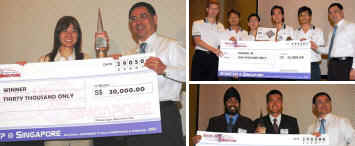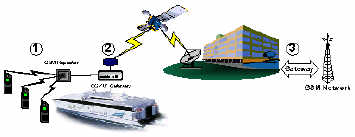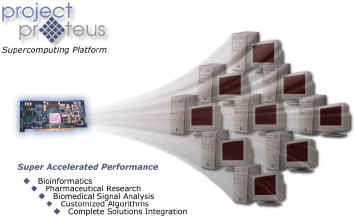Special Feature: Start-Up@Singapore 2004

World Indigo. Project Proteus. Fanciful-sounding names they may have, but do not belittle the promising business ideas these two young start-ups have. Their innovations are certainly one-of-its-kind in their respective industries.
Take for example World Indigo, grand winner of the Start-Up@Singapore business plan competition 2004. Led by Ms Goh Yiping, a National University of Singapore (NUS) Overseas College student, World Indigo aims to be the market leader in providing low cost text messaging (SMS) and email services to passengers’ mobile phones onboard ferries, trains and airplanes worldwide. Although there had been attempts to enable communications on moving vehicles via voice or Internet access, the costs of setting up such a system is just too expensive.

World Indigo’s proprietary technology, which places an in-vehicle equipment that comprises a communication gateway, global satellite link and a low power wireless network, detects a phone call and forwards it across a satellite network to an operation center in Singapore which then deliver it to the intended destination (Source: World Indigo press release). If you’re a business traveler, World Indigo’s services would indeed be a godsend to you. You could use your mobile phone as seamlessly (and cheaply too!) as you normally would on the ground.

Although Project Proteus finished as runner-up in the competition, its Proteus Solution is no less promising. Advances in genetic sequencing have resulted in a flood of data available for analysis, causing genetic databases to double in size every 12 months. Luckily for the bio-informatics and biomedical market, Project Proteus provides a reconfigurable computing platform that accelerates the data processing process – the Proteus Solution consisting of the Proteus Board, the Proteus Software Platform and Algorithms. “The amount of genetic data has been growing at a rate faster than what normal processors can keep up with. This means that the time taken for research will increase and the cost of upgrading computer hardware speeds will keep on increasing. The Proteus Solution is a speed increasing, cost effective and space saving solution for their (biotech companies) problems.” – says team member Mr Kelly Choo. There’s no doubt that biotech companies will be flocking to Project Proteus once this Ngee Ann Polytechnic research project officially becomes a commercial entity.
To give you an idea of how fast the platform is, one Proteus Board is about 100 times as fast as a Pentium 4 PC. Imagine several Proteus Boards hooked up together?
The recently-concluded Start-Up@Singapore National Business Plan Competition, jointly organised by the NUS Entrepreneurship Centre and NUS Business School Alumni Association, encourages the growth of entrepreneurship through education and competition. The winner of the 5th Start-Up@Singapore received a cash prize of $30,000 while the first and second runners-up each received $10,000. That’s a lot of start-up capital for the winners, eh?
Related Ideas & Trends
http://www.startup.org.sg
http://newshub.nus.edu.sg/pressrel/0405/040530.htm
http://www.nus.edu.sg/enterprise/newsletter/june04/happenings/startup.htm
Innovative Business Ideas From Enterprising Youths
(Visited 41 times, 1 visits today)